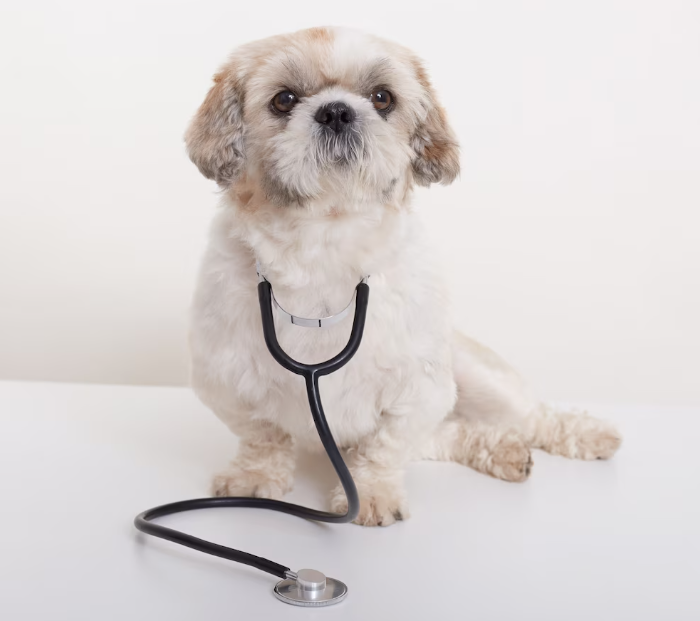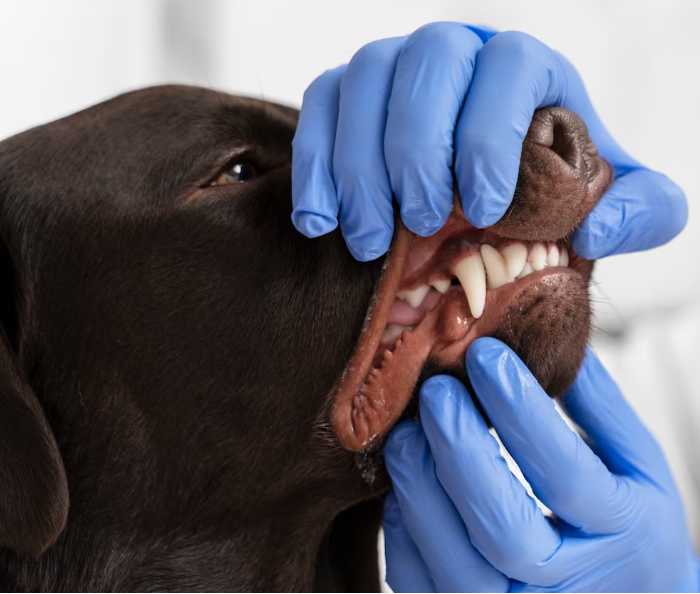2023-11-06
As loving and responsible pet owners, it is our goal to provide our beloved companions with the best possible care to ensure that they lead a happy and healthy life.
A crucial aspect of their well-being is their heart health. A healthy heart ensures that our furry friends can live long, active, and fulfilling lives by our side. Just like humans, dogs can also suffer from heart problems, but there are various preventive measures we can take to protect them.
In today’s article, we will explore different aspects of heart health and will give you tips on how to keep your dog's heart healthy.

Proper nutrition plays a vital role in maintaining the hearts of our paw friends healthy. A well-balanced diet provides essential nutrients that support heart function and overall well-being.
According to studies, a diet rich in omega-3 fatty acids can have a positive impact on heart health. Omega-3 fatty acids, which are commonly found in fish oil, help reduce inflammation, regulate blood pressure, and improve circulation.
You may want to consider including heart-healthy foods such as salmon, mackerel, and flaxseed oil in your dog's diet.
However, you should not forget to consult with a veterinarian first, as they will give you proper advice based on your dog’s health, age, breed, and lifestyle. Also, it is highly recommended that you do not make any abrupt changes in your dog’s diet, but add supplements gradually, by constantly observing how their body responds.
You should avoid too salty and fatty foods, as they can contribute to developing heart problems, just as they do in humans.

Just like with humans, regular exercise is essential for dogs too to keep their hearts healthy and strong.
It is advisable, that you keep your paw friend engaged in physical activities that help them maintain a healthy weight, strengthen their cardiovascular system, and reduce the risk of heart disease.
Simple activities like taking your paw friend on daily walks, playing fetch with them in the local park, or motivating them to engage in interactive games that encourage movement, can be both very pleasant and healthy. Not to mention that they will have a positive impact on your health too.
Additionally, keeping your beloved paw companion at their ideal weight is crucial for their heart health.
Obesity in dogs can lead to fat buildup in the arteries, which damages them and may cause heart issues. By keeping your dog on a balanced diet and ensuring sufficient exercise, based on their specific needs, you can help them maintain a healthy weight, promoting optimal heart function.

Regular veterinary checkups are vital for your dog's heart health. Your veterinarian can perform routine examinations to detect any early signs of heart issues.
The routine checkups usually take place on an annual basis but can be done more often if your dog is a senior or suffers from a health condition. Pups should also undergo regular checkups every month or every 2–3 months.

Apart from checkups, it is essential to be aware of potential warning signs of heart problems in your paw friend, such as coughing, lethargy, difficulty breathing, or fainting.
If you notice any of these symptoms, you should contact a veterinarian immediately. Early detection and proper treatment can significantly improve the outcome and ensure that your canine will lead a healthy life.

Heartworms can be passed to dogs through a mosquito bite and not through other dogs. Having said that, they are not contagious. In order to prevent your dog from being infected by heartworms, regular parasite control is recommended.
Talk to a veterinarian about your location and the risk of being bitten by a mosquito that transfers heartworms.

Stress can have a very negative impact on both humans and dogs, affecting their heart health.
Dogs, like us, can experience stress from various factors, such as changes in their environment, routine, or interactions with other pets or people. Chronic stress can lead to increased levels of cortisol, which may negatively impact the heart and contribute to developing heart disease.
It is essential for both humans and dogs to have the right balance of cortisol to avoid health issues. If you are wondering how to create a stress-free environment for your beloved paw companion, here are a few tips that may help you:
-Know your dog well, to make sure that you can recognize when they are stressed, anxious, and triggered by a stimulus;
-Set up an area at home that will be specifically designed for your dog and which will ensure they can relax and rest;
-Do not make any abrupt changes in your dog's environment or diet. If changes can not be avoided, i.e. you are moving to a new home, then you should try to turn your dog’s spot into a comfortable safe zone for them.
-Socialize your dog extensively. Socialization is crucial for dogs to be able to calmly respond to various triggers in their environment, including sounds, other animals, and people. Socialization will your furry friend learn to remain calm and alleviate the potentially negative emotional effect that unknown people, animals, and places have on them.
-Desensitization and counter-conditioning can be very helpful. By gradually exposing your canine to stimuli that provoke anxiety, fear, or other unwanted reactions or behaviors, you can make sure that they will get used to these stimuli over time. You should start by keeping the intensity of the stimuli at a low level.
Counter-conditioning is related to the process of rewarding the dog in the presence of the stimuli, to help them develop a positive attitude towards them.

Both mental and physical exercises are essential for your dog’s general well-being including their heart health. Engage your furry companion in activities that challenge their mind and keep it sharp, such as puzzle toys, interactive games, or obedience training. Mental stimulation can reduce stress, contributing to a healthier heart.

Hydration is essential for the health of our paw friends, especially during the hot season. Make sure that your canine has access to fresh water throughout the day. Do not forget to take a bottle of water for your canine during your daily walks
Place your dog’s water bowl in a spot easy to access and remember to check it several times during the day and refill it when needed.
Dehydration can be a cause of different health conditions, including heart problems, so always consider it a high priority.

Some of you may ask: “What is the connection between dental care and heart health at all?”
Untreated dental issues can lead to infections which can transition from the gums to the bloodstream. They can affect important organs, including the heart. Our advice is to always pay attention to all aspects of your dog’s health, including oral hygiene. Regular brushing your dog’s teeth with a paste specially designed for dogs will help prevent the plague from building up.

Good sleep and rest are crucial for our and our paw friends’ physical and mental health and general well-being. We would recommend that you ensure that your doggo has comfortable bedding/sleeping zone, where they can relax without being disturbed. Good sleep is a prerequisite for maintaining your paw friend’s heart healthy!

While physical stimulation is an important part of keeping our dogs healthy, sport overdoing may have the opposite effect. We strongly advise you to avoid overly intensive activities such as very fast running or continuous jumping, especially if the temperatures are high. Always take your paw friend’s physical limitations into account and exercise your dog accordingly.

Talking about intensive activities in the hot weather, you should also avoid engaging with your dog in activities when the temperatures are very high. Extreme temperatures may cause heat stroke and affect your paw friend’s heart.
This is why during hot weather, you should provide your dog will shade and much water. You may want to consider taking your canine on a walk early in the morning and the evening when the temperatures are more bearable.
Also, you should keep in mind that surfaces like asphalt and concrete get extremely hot and can injure your dog’s paws, so you should avoid them.

You can consult with a veterinarian and ask about recommendations for supplements for the heart. Based on your dog’s needs, age, and breed they can prescribe supplements that may include Coenzyme Q10, L-carnitine, and taurine.

Just like in humans, being exposed to secondhand smoke can lead to a higher risk of heart issues in dogs too. If you are a smoker, you may want to smoke outside away from your paw friend. That way you will protect them from the harmful effects of secondhand smoke.

Before getting a puppy, you should get familiar with any genetic diseases and predispositions common for the breed.
For instance, dog breeds such as the Cavalier King Charles Spaniel, the Boxer, the Great Dane, the Doberman Pinscher, the Miniature Schnauzer, the Dachshund, and the Miniature and Toy Poodle are more prone to heart conditions than other breeds.
Remember, that as responsible pet owners, we should stay informed and proactive in caring for our four-legged companions. By taking proper care of our dogs’ heart health, we ensure that they will lead a long and happy life.